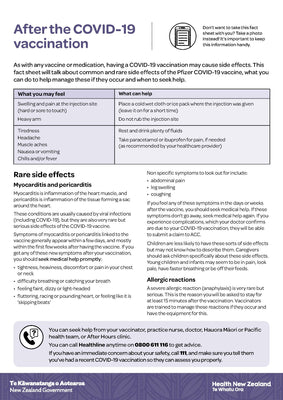After the COVID-19 vaccination - HP8591

Information for consumers about the COVID-19 vaccine and potential side effects.
Printed copies can be ordered from the National Immunisation Programme Bluestar portal https://portal.bluestar.co.nz/login/moh_vaccine
The full resource:
As with any vaccine or medication, having a COVID-19 vaccination may cause side effects. This fact sheet will talk about common and rare side effects of the Pfizer COVID-19 vaccine, what you can do to help manage these if they occur and when to seek help.
|
What you may feel |
What can help |
|
Swelling and pain at the injection site (hard or sore to touch) Heavy arm |
Place a cold wet cloth or ice pack where the injection was given (leave it on for a short time) Do not rub the injection site |
|
Tiredness Headache Muscle aches Nausea or vomiting Chills and/or fever |
Rest and drink plenty of fluids Take paracetamol or ibuprofen for pain, if needed (as recommended by your healthcare provider) |
Rare side effects
Myocarditis and pericarditis
Myocarditis is inflammation of the heart muscle, and pericarditis is inflammation of the tissue forming a sac around the heart.
These conditions are usually caused by viral infections (including COVID-19), but they are also very rare but serious side effects of the COVID-19 vaccine.
Symptoms of myocarditis or pericarditis linked to the vaccine generally appear within a few days, and mostly within the first few weeks after having the vaccine. If you get any of these new symptoms after your vaccination, you should seek medical help promptly:
- tightness, heaviness, discomfort or pain in your chest or neck
- difficulty breathing or catching your breath
- feeling faint, dizzy or light-headed
- fluttering, racing or pounding heart, or feeling like it is ‘skipping beats’
Non specific symptoms to look out for include:
- abdominal pain
- leg swelling
- coughing
f you feel any of these symptoms in the days or weeks after the vaccine, you should seek medical help. If these symptoms don't go away, seek medical help again. If you experience complications, which your doctor confirms are due to your COVID-19 vaccination, they will be able to submit a claim to ACC.
Children are less likely to have these sorts of side effects but may not know how to describe them. Caregivers should ask children specifically about these side effects. Young children and infants may seem to be in pain, look pale, have faster breathing or be off their feeds.
Allergic reactions
A severe allergic reaction (anaphylaxis) is very rare but serious. This is the reason you will be asked to stay for 15 minutes after the vaccination. Vaccinators are trained to manage these reactions if they occur and have the equipment for this.
You can seek help from your vaccinator, practice nurse, doctor, Hauora Māori or Pacific health team, or After Hours clinic.
You can call Healthline anytime on 0800 611 116 to get advice.
If you have an immediate concern about your safety, call 111, and make sure you tell them you've had a recent COVID-19 vaccination so they can assess you properly.
For those who have diabetes
Some people with diabetes have noticed their blood sugar levels may be higher or lower than usual in the days after their vaccination. If you have diabetes and are taking insulin, you should monitor blood sugar levels more closely for 2-3 days after your vaccination. Contact your doctor or practice nurse if you are concerned.
Vaccines protect us
Vaccines help protect people of all ages against many infectious diseases, like measles and flu. Check you and your whānau are up to date with your vaccinations by talking with your healthcare provider.
There are no concerns around the timing of other non-COVID-19 vaccines such as measles, mumps, rubella; you do not need to delay any of these vaccinations.
Visit info.health.nz for more information on what vaccines you and your whānau may be due for.
Reporting side effects
It’s important you report any reactions you or your child has following their COVID-19 vaccination so we can keep tracking the safety of the vaccine.
You can report any side effects you or your child experiences at info.health.nz/ReportSideEffect or talk to your healthcare provider if you wish to discuss reporting side effects. You don’t need to be certain that the vaccine caused the reaction to submit a report.
Post Vaccine Symptom Check (PVSC)
You may receive a text message inviting you to take part in a survey after your vaccination. If you do, please take the time to complete the survey. Your responses and feedback are very important to us. We would like to hear about your experience, how you felt after the vaccination, and if you had any side effects. Any data you provide will be kept confidential and individual responses will not be shared.
After your vaccination, it's still important to:
- Stay home when sick and away from people who could get really sick including pregnant people
- Wash or sanitise your hands
- Wear a mask around others if you are coughing and sneezing
To book your next vaccine visit info.health.nz/bookavaccine or phone 0800 28 29 26
If you get COVID-19 before your next vaccine is due, you should wait at least 6 months after you tested positive before getting another vaccine.
It is important to keep up to date with with all vaccinations including COVID-19 vaccinations to give you and your whānau the best protection.